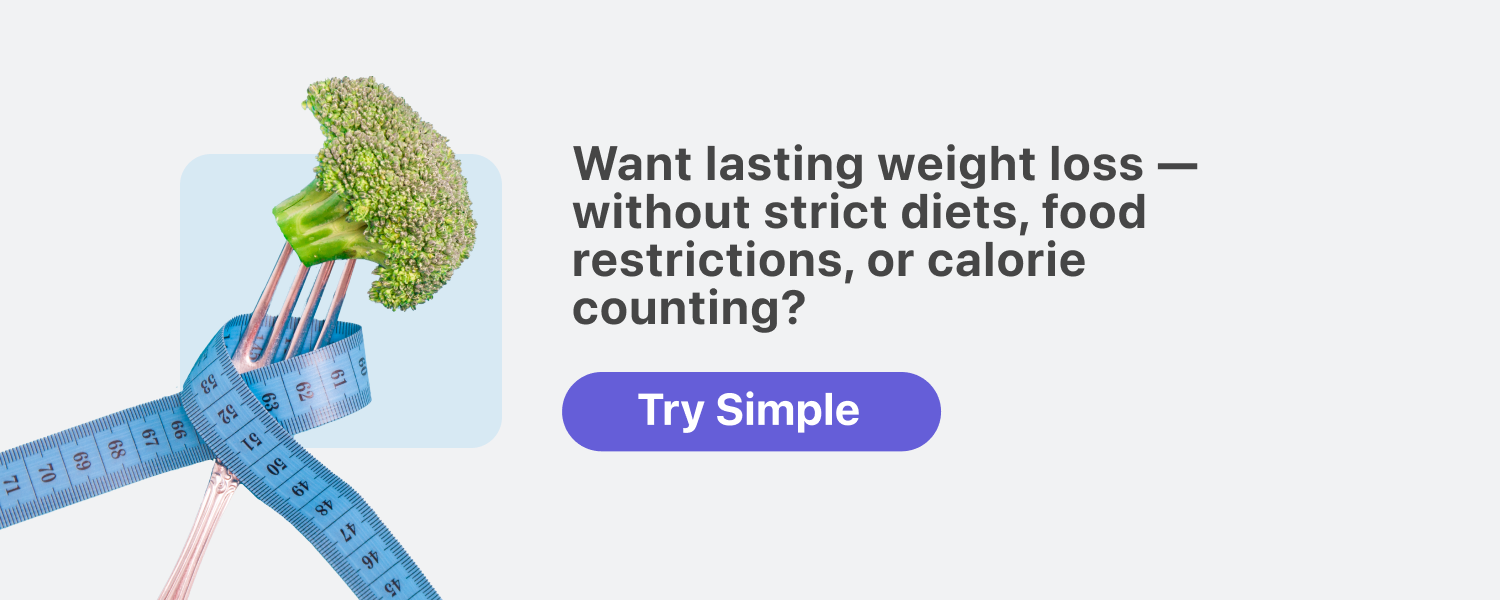The 12-hour intermittent fasting schedule — a guide by Simple

If you want to lose weight, make better food choices, and feel empowered in the bargain, why not give 12-hour intermittent fasting a shot?!

Don’t worry — this is no fad diet. It’s actually pretty simple and straightforward:
Each day, you eat over a 12-hour period and fast for the remaining 12. If you’re thinking, “But won’t I be super hungry if I don’t eat for 12 hours???” no worries. We have some tips and tricks to help you adapt.
Plus, one huge bonus: no counting calories!! You can eat in the way that best suits you without having to log every mouthful in some elaborate spreadsheet. We’ll give you some pointers later that’ll help you both enjoy your food and hit your goals.
Ready to dive in? Let’s get into it.
What is the 12-hour intermittent fasting schedule?
The 12-hour intermittent fasting schedule involves eating all your meals within a 12-hour window and then fasting for the remaining 12 hours that day.
For example, say you finish dinner at 7 PM. If you’re following a 12-hour intermittent fasting schedule, you wouldn’t eat or drink anything (beyond zero-calorie drinks like water) until 7 AM the next day.
When this window occurs is totally up to you. Maybe you get home late or don’t put the kiddos to bed until 7, so you don’t finish dinner until 9 PM. No problem — just start your eating window at 9 AM instead. Or maybe you have an early start to the day and want to have breakfast around 6 AM. Just finish dinner by 6 PM.
This schedule is a perfect intermittent fasting schedule for beginners as it’s got a long eating window, and a huge chunk of the fast happens overnight or whenever you normally sleep! (Yep, if you work the night shift and sleep during the day, you can try 12-hour intermittent fasting, too!)
How does the 12-hour intermittent fasting schedule work?

At Simple, we like to make things simple so you can just get right to it. With that in mind, here’s our five-step process for getting started with 12-hour intermittent fasting.
Step 1: Choose your fasting time
Find a 12-hour fasting period that works for you.
For example, if you rise at 6 AM and can’t function for longer than an hour without food, start fasting at 7 PM so you can eat breakfast at 7 AM. But, if you’re a night owl who loves to eat late, maybe try a fasting window that starts at 9:30 PM and runs till 9:30 AM.
Having a 12-hour intermittent fasting schedule that suits you sets you on the road to success.
Step 2: Stay hydrated
Drinking plenty of water will help you avoid a lot of the intermittent fasting side effects you could otherwise experience, like headaches, lightheadedness, bad breath (eek!), and fatigue.
It’s also one of the key ways to hack hunger while fasting.
Step 3: Plan your meals
Having a meal plan is crucial when you’re intermittent fasting every 12 hours.
Planning your meals ahead of time can really help you stay on track and make sure you get high-quality foods into your diet more frequently (which in turn can squeeze out some lower-quality foods with less effort).
We can help you build a meal plan that prioritizes nutrient-dense whole foods.
Step 4: Listen to your body
Your body will give you signs, like dizziness or lightheadedness, if some of your needs are not being met.
If you notice your energy is consistently low and you feel exhausted or unwell, pay attention to this. It might mean you need to eat more or fast less, or just ease yourself into this change more gradually. Let your body guide you — it knows its stuff!

What to eat on the 12-hour intermittent fasting schedule meal plan
Knowing what to eat when intermittent fasting to make sure you’re:
- getting the nutrients you need
- boosting your health
- setting yourself up for success with your weight loss goals
is only half the battle. Plugging those foods into an effective meal plan is the other. Here’s a quick breakdown to get you cooking.
1. Prioritize proteins, healthy fats, whole-grain carbohydrates, fruits, vegetables, and calcium-rich foods.
2. Consider meal timing, such as having a larger breakfast if you work during the day or an afternoon snack if you exercise before dinner.
3. To help you on those extra-tired days when you’re out of effs to give, prep some meals in advance and throw them in the freezer.
4. For off-plan-snaccident avoidance, consider keeping only foods you want to eat — i.e., those which don’t trigger binges or make you feel guilty — in your home. Don’t worry, you don’t have to say au revoir to any foods you love. If you adore pastries or ice cream, not a problem. This is simply a strategy to help you eat them when, where, and in the quantities you want.
Are you already feeling up for trying it out? Cool — hit up our Simple quiz, and you’ll be off and running!
The 12-hour intermittent fasting schedule and weight loss
The 12-hour intermittent fasting schedule can be an effective weight loss strategy for two key reasons.
First, it creates a calorie deficit. Eating less than you burn causes weight loss.
Second, when you fast for 12 hours, your body is forced to use stored energy in the form of fat. This process is called ketosis, and losing those fat stores can equal weight loss (so long as a caloric deficit is still present).
An extra bonus that can happen when 12-hour fasting: the limited window for eating may encourage you to make healthier food choices and leave less room for lower-quality, health-depleting foods.
Can the 12-hour intermittent fasting schedule create weight loss results?
Yes and no.
Everybody is different; depending on your eating habits before intermittent fasting and your eating habits while intermittent fasting, you may naturally lose weight just by taking a longer break between dinner and breakfast.
However, if you’re specifically fasting to lose weight, you may have more luck with a slightly longer fasting window as you’re more likely to reach that fat-burning state of ketosis. While 12-hour fasting tends not to lead to weight loss to the same extent, it’s a great stepping stone for the 14- or 16-hour fasts more likely to get you there.
Potential health benefits of the 12-hour intermittent fasting schedule

Science shows plenty of potential ways 12-hour intermittent fasting benefits our health. Let’s talk about those.
Better weight management
As we’ve seen, intermittent fasting can help with weight loss and improve weight control.[1] There aren’t many studies looking at 12-hour fasts specifically, but our user data shows that a 12-hour fast can lead to weight loss results. Could 12-hour intermittent fasting create results for you? Try it and see! (So long as it’s safe for you to do so.)
Improved blood sugar control
Intermittent fasting may improve how your body processes sugars and fats from the food you eat, which can improve insulin resistance and promote weight loss.[2,3]
It is worth noting that these benefits may be more likely with longer fasts, such as 16:8 or 18:6.[4]
Increased heart health
Studies have found that intermittent fasting can improve your heart health by reducing blood pressure, triglycerides, and cholesterol levels for those living with overweight and obesity.[2,5] Again, these studies typically use longer fasts.
Improved brain function
There is some evidence that intermittent fasting might improve brain function and protect against neurodegenerative diseases like Alzheimer’s and Parkinson’s.[6] However, more research in the form of long-term human studies is needed to be able to validate this, especially on shorter fasts such as 12:12.
Gut health
Some evidence suggests that intermittent fasting can help keep your gut happy, but again, we need more research to say whether this is true for 12-hour fasting.[7]
Health risks of the 12-hour intermittent fasting schedule
Disordered eating
If you have a history of struggling to detach from restrictive food rules or getting tangled up emotionally by diet plans, fasting isn’t something we’d recommend as the kindest or safest approach for your body.
If you don’t have a history of disordered eating habits, but you notice new behaviors or patterns pop up when fasting, like over-restricting your food or over-indulging and then avoiding, again, those are signs that fasting isn’t the best approach for you.
Nutrient deficiencies
If you don’t plan your meals well, you could find it harder to meet your daily nutritional requirements.
This is especially true for those with medical conditions. If this is you, make sure to talk to your doctor before trying intermittent fasting to make sure you keep yourself safe and well-nourished.

Dehydration
Fasting for extended periods of time can increase your risk of dehydration, which can lead to headaches, fatigue, and brain fog.
So, make sure you drink plenty of water. (Maybe set your drink reminder now. We’ll wait.) Oh, and if you are in the “water is DULL!!” camp, no worries. What else can you drink while fasting? Loads of things!
To give you even more of a leg-up in the hydration game, take our Simple quiz and get your hands on our hydration tracker (as well as a fasting buddy!). We’ll send you reminders to drink, which can be your cue to get your H2O on!
Low blood sugar
Intermittent fasting can lead to low blood sugar levels, which can cause dizziness
and weakness.[2] If you start feeling woozy, break your fast and grab a snack!
Is fasting for 12 hours safe?
Let’s face it, fasting can seem pretty difficult. The thought of going without food for an extended period can make even the most hardcore dieter weak in the knees.
But what about fasting for 12 hours? Is it safe?
For most people, yeah! In fact, you may be doing it without even realizing it. When was the last time you ate dinner and then didn’t eat again until breakfast or lunch the next day? Just like that, you just completed a 12-hour fast! (And it wasn’t even that tough, was it!?)
But it’s not safe for everybody. This includes people who
- have a body mass index (BMI) <18.5
- have (or are at risk of having) an eating disorder or have a history of one
- are under 18 or 80 years or older
- have a medical condition
- take prescription medications
- are pregnant, breastfeeding, or trying to conceive
- are extremely active
If any of these apply to you, don’t try 12-hour intermittent fasting unless you have your doctor’s permission.
Pros and cons of the 12-hour intermittent fasting schedule
| Pros | Cons |
| It can help you lose weight | Risks include overeating, hunger, and dehydration |
| It can improve blood sugar control | It can be hard to adjust to |
| It’s simple and flexible | It’s not suitable for everyone |
| It may increase overall health | More research is needed |
Pros
12-hour intermittent fasting can lead to some great results in weight loss, blood sugar control, and improved overall metabolic health. Plus, it’s pretty simple to do and has a ton of flexibility, so you can tailor it to your life.
Cons
That said, it’s not all smooth sailing. You could get pretty hungry (at least at first, while you’re adjusting). There are risks involved, like dehydration and overeating. It’s not for everyone, and while there is research on 12-hour intermittent fasting’s benefits, more is needed to show its long-term effectiveness and safety.
Is the 12-hour intermittent fasting schedule right for you?

Now that you know all about the 12-hour intermittent fasting schedule, you might be wondering: is it for me?
If you’re the type of person who can’t go more than a few hours without snacking, then the 12-hour intermittent fasting schedule might not be for you. Then again, it might be. Fasting this way can actually help with unwanted snacking.
Here’s the thing about 12-hour fasting:
You kinda need to try it to know whether it’s for you or not.
So … why not give it a go? If you love it, awesome! If you don’t, that’s cool. You tried something new, and you’re the wiser for it.
If you do love 12-hour fasting, it may also be a good first step to other fasting schedules, like 14:10 intermittent fasting or 16:8 intermittent fasting. For instance, if you’re considering 12:12 vs. 16:8 intermittent fasting, the former could be a good way to ramp up slowly and safely to the longer fasting window of the latter.
While no fasting schedule is better than any other in terms of creating more potential or momentum for results like weight loss and fat burning — it’s all about what works for you and your goals — you may see increased benefits with a 14:10 or 16:8 fasting schedule since you may be more likely to hit ketosis, and you may even hit autophagy (a natural cellular degradation and rejuvenation process) with an 18-hour fast. Just keep in mind that a longer fasting window may also mean more risk of potential side effects, and we don’t recommend fasting for 18+ hours without medical supervision!
No one has the exact same fasting experience, so the answer to “Is intermittent fasting safe, and if so, for how long?” will vary from person to person. That’s why we always recommend speaking with your primary care provider before making any decisions about your eating routine. They’ll be able to help you understand the differences between intermittent fasting schedules and which one(s) might be right for you.
Frequently asked questions about the 12-hour intermittent fasting schedule
Yes, 12 hours of fasting is enough — even this short fast can lead to health benefits and weight loss.
Longer fasting periods can potentially increase those benefits, but 12 hours is a great — and safe — place to start before ramping up to extended fasts.
Most intermittent fasting studies use 16:8 and 18:6 schedules rather than 12:12. That doesn’t mean that 12:12 doesn’t have benefits, just that we don’t know for sure — but we do know from the studies using longer fasts that intermittent fasting has some associated benefits.
It can reduce inflammation, improve your body’s response to insulin, and help you lose weight. It may also improve your sleep and lower your risk of chronic diseases such as type 2 diabetes, heart disease, and cancer.[8,9]
How much weight you can lose from fasting for 12 hours will vary from person to person and depend on factors like food choices, activity levels, etc.
That said, studies have shown that intermittent fasting can help individuals lose up to eight pounds in just 4 weeks![10] Studies even show that, unlike dieting, intermittent fasting does not slow your metabolism.
It’s possible. Not everyone will drop into ketosis with a 12-hour fast, but some will.
Even if you don’t burn fat on a 12-hour fast, your health will still benefit, and you can still lose weight (you only need to eat less than you burn for that to happen).
Nope, coffee is not a fast-breaker … unless it’s got milk, cream, or sugar in it!
Black coffee is good to go throughout your fasting window. You can even add in one coffee with a couple tablespoons of milk and still be fasting. Check out our guide for more on what breaks a fast.

- Seimon RV, Roekenes JA, Zibellini J, Zhu B, Gibson AA, Hills AP, et al. Do intermittent diets provide physiological benefits over continuous diets for weight loss? A systematic review of clinical trials. Mol Cell Endocrinol. 2015 Dec 15;418 Pt 2:153–72.
- Yuan X, Wang J, Yang S, Gao M, Cao L, Li X, et al. Effect of Intermittent Fasting Diet on Glucose and Lipid Metabolism and Insulin Resistance in Patients with Impaired Glucose and Lipid Metabolism: A Systematic Review and Meta-Analysis. Int J Endocrinol. 2022 Mar 24;2022:6999907.
- Moro T, Tinsley G, Bianco A, Marcolin G, Pacelli QF, Battaglia G, et al. Effects of eight weeks of time-restricted feeding (16:8) on basal metabolism, maximal strength, body composition, inflammation, and cardiovascular risk factors in resistance-trained males. J Transl Med. 2016 Oct 13;14(1):290.
- Sutton EF, Beyl R, Early KS, Cefalu WT, Ravussin E, Peterson CM. Early Time-Restricted Feeding Improves Insulin Sensitivity, Blood Pressure, and Oxidative Stress Even without Weight Loss in Men with Prediabetes. Cell Metab. 2018 Jun 5;27(6):1212–21.e3.
- Patikorn C, Roubal K, Veettil SK, Chandran V, Pham T, Lee YY, et al. Intermittent Fasting and Obesity-Related Health Outcomes: An Umbrella Review of Meta-analyses of Randomized Clinical Trials. JAMA Netw Open. 2021 Dec 1;4(12):e2139558.
- Gudden J, Arias Vasquez A, Bloemendaal M. The Effects of Intermittent Fasting on Brain and Cognitive Function. Nutrients [Internet]. 2021 Sep 10;13(9).
- Mousavi SN, Rayyani E, Heshmati J, Tavasolian R, Rahimlou M. Effects of Ramadan and Non-ramadan Intermittent Fasting on Gut Microbiome. Front Nutr. 2022 Mar 22;9:860575.
- Barvaux VA, Aubert G, Rodenstein DO. Weight loss as a treatment for obstructive sleep apnoea. Sleep Med Rev. 2000 Oct;4(5):435–52.
- Vasim I, Majeed CN, DeBoer MD. Intermittent Fasting and Metabolic Health. Nutrients [Internet]. 2022 Jan 31;14(3).
- Gabel K, Hoddy KK, Haggerty N, Song J, Kroeger CM, Trepanowski JF, et al. Effects of 8-hour time restricted feeding on body weight and metabolic disease risk factors in obese adults: A pilot study. Nutr Healthy Aging. 2018 Jun 15;4(4):345–53.
